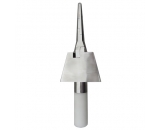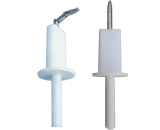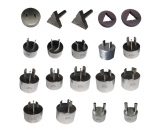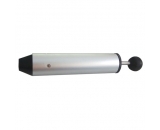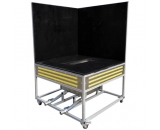蚊子喜欢咬你吗?
Two or three times a month, Leslie B. Vosshall, the Robin Chemers Neustein Professor in the Laboratory of Neurogenetics and Behavior, at the Rockefeller University, is required to feed the subjects under inquiry in her lab. In order to do so, she rolls up her sleeve and inserts her arm into the netting cage in which the creatures in question, mosquitoes, are kept. It’s not unusual for her to get two hundred and fifty bites in a few minutes, she explained the other day, with blasé good humor.每个月都会有这么两三次,来自于Rockfeller大学神经以及行为学研究实验室的Lesile B. Vosshall教授就要喂她的研究对象食物。她会怎么做呢?她会卷起他的袖子把自己的手伸进一个箱子里,这个箱子里养满了他们的研究对象,蚊子。她事后毫无感情色彩的解释说,对于她来说几分钟之内被咬250次其实很正常。
Vosshall is attempting to discover why some people seem more attractive to mosquitoes than others. “Some people are mosquito magnets—I think this has been reported anecdotally ever since there have been people,” she said. Vosshall herself is not particularly attractive to mosquitoes, unless she is sticking her arm into a cage of them. But last week, with mosquito season well under way, she visited Brooklyn to discuss the implications of her research for those New Yorkers for whom being made a meal of is an annual blight rather than a professional obligation.
Vosshall的研究目的在于探索为什么有些人就是更容易吸引蚊子一些。她说有些人就像蚊子磁铁一样,这个说法在有人的时候就已经被传开了。但是Vosshall本人其实并不是一个非常惹蚊子的人,除非她把手伸进养着蚊子的箱子里。就在上周,Vosshall在蚊子盛行的季节来到美国的布鲁克林和纽约客的编辑们一起探讨他的研究内容,当然对于这些纽约客们,被蚊子饕餮是一年一次的倒霉日子而不是研究必须。
First stop: the Union Street Bridge over the Gowanus Canal. Vosshall, who is a tall forty-six-year-old with long light-brown hair, was dressed boldly, under the circumstances, in a short black-and-white shift that covered her arms but exposed her legs. Native mosquitoes, Culex pipiens, are more likely to go for the face and the neck, she explained; it’s the mosquitoes that carry malaria, Anopheles gambiae, that like biting the feet. For illustrative purposes, Vosshall had brought along a test tube containing fetid water in which centimetre-long larvae frantically squiggled.
第一站就是位于Gowanus运河之上的联合街大桥。Vosshall这位46岁有着一头棕发的高个科学家穿着非常醒目,她穿着黑白相见的上衣,但是穿着夏季的短裤,因此她的腿是露在外面的。他说美国本地的Culex popiens蚊子更倾向于叮咬脸和脖子;而传播疟疾的Anopheles gambiae则更喜欢叮咬脚部。为了进一步讲清楚事情,Vosshall从英国带来了一个有大概1厘米左右长的蚊子幼虫装载一个实验盒子里,这些虫在污秽的水里快速的蠕动着。
She peered from the bridge down into the water below, where leaf litter floated amid iridescent patches of kerosene. The stagnant edges of the canal, she noted, might provide a good breeding ground, as would pools of water in the hollows of wooden pilings. “Mosquitoes don’t like water too clean—Poland Spring is not going to be attractive,” she said. The reported presence of fish in the canal would, however, be some deterrent. “Fish are predators, so if you are a good mosquito mom you are not going to lay your eggs there,” Vosshall said. It is a little-known fact that only female mosquitoes bite. “The males are peaceable—they feed on flowers,” she said, conjuring the image of billions of teeny-tiny Ferdinand the Bulls, idling the days away among the milkweed.
她走在最前面进入了桥下的水里,在煤油灯的微光下水上的树叶显现出来。在比较脏的运河边,他说伴随这些树枝和树叶的堆积,这个蓄水池成了蚊子非常适宜的出生地。她说:蚊子不喜欢干净水,波兰的温泉它们就不喜欢。但是运河里面的鱼会是影响蚊子生长的因素。因此如果你是一个称职的蚊子妈妈你就不会把蛋下在干净水边。但是很少有人知道,其实只有母蚊子才咬人。公蚊子其实比较和平,他们吃花草。她又补充说:你可以想象千万只非常小的Ferdinand公牛在草原上游荡的场景。
Next stop: the shady Fort Greene back yard of a writer who has been a magnet for mosquitoes since childhood. Having cased the joint for standing water—a single empty plant dish with an inch of liquid was found, and declared uninfested—Vosshall explained that there are numerous theories about what draws mosquitoes to one person and not another. “There’s something about the composition of the blood—substance X—that they can figure out,” she said. One study has shown that mosquitoes prefer to bite people who have been drinking beer over those who have been imbibing water. The allure of wine for mosquitoes remains, unfortunately, unstudied.
第二站是一个作家的阴凉后院,这位作家从小就特别招蚊子。由于各个衔接处都是防水的,因此只在一个花盆里找到了大约1英尺的液体,但是被判断为没有蚊子——Vosshall解释说有很多种的可能可以解释某些人特别惹蚊子但是有人就不惹蚊子。到现在为止他们发现血液里的X成分可能是一个原因。一项研究表示蚊子更喜欢那些喝了啤酒的人而不是那些喝水的人。但是白酒对蚊子的吸引力还没有得到证实。
Vosshall dismissed much of the folk wisdom traded among residents of brownstone Brooklyn about effective mosquito deterrence. A fire pit? “You can confuse mosquitoes with fire, but it has to be a smelly, smoky fire—you can’t have one of those fancy hotel-fire displays,” she said. Growing lemon balm or planting marigolds? “People do use botanicals, but you have to have a lot of plants,” she said. She did endorse the use of the Mosquito Magnet, a device that first attracts mosquitoes by producing carbon dioxide and heat, then fatally sucks them up. “But it’s a little bit dangerous,” she added. “All the mosquitoes from far and wide will come, and you are gambling that they will be more attracted to the machine than they are to you.”
Vosshall排除大部分在布鲁克林广泛流传的可以有效驱赶蚊子的办法。一个篝火?Vosshall表示已可以用火的烟来误导蚊子,但是必须是非常浓重的烟雾,你不可能在高级宾馆里获得这种待遇。种植金盏菊或者柠檬?他说这些东西确实是生物学里有效的方法,但是你必须有很多这样的植物。但是Vosshall赞同使用一种叫做的蚊子磁铁的装置,这种装置通过产生二氧化碳和热量吸引蚊子等它们接近了直接搞死它们。但是Vosshall说这个比较危险因为这个装置甚至会吸引很多很远的蚊子,但是谁又能保证蚊子会对那个装置更有兴趣而不是对你更有兴趣呢?
If you should get bitten, the most effective treatment Vosshall has found is to immediately run the welt under the hottest water tolerable. How this works is as mysterious as the logic of mosquitoes’ blood preferences. “The mosquitoes leave a protein on the skin, so it could be that the hot water cooks it, like cooking an egg,” she suggested. “That’s one idea. The other idea is that you are exchanging one form of pain for another.”
如果你还是不幸被叮咬了,那么Vosshall发现最好的办法就是迅速用你能忍受的最热的水来冲洗伤口。但是为什么这会起作用就和为什么蚊子对血感兴趣一样还不能解释。Vosshall说:蚊子在叮咬完了之后会留下蛋白质,可能这些热水就像煮鸡蛋一样使那些蛋白质变质了。但是你也要明白,这种方法只是帮助你在两种不同的痛苦之间转换罢了。
If you should get bitten, the most effective treatment Vosshall has found is to immediately run the welt under the hottest water tolerable. How this works is as mysterious as the logic of mosquitoes’ blood preferences. “The mosquitoes leave a protein on the skin, so it could be that the hot water cooks it, like cooking an egg,” she suggested. “That’s one idea. The other idea is that you are exchanging one form of pain for another.”
页:
[1]









